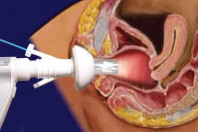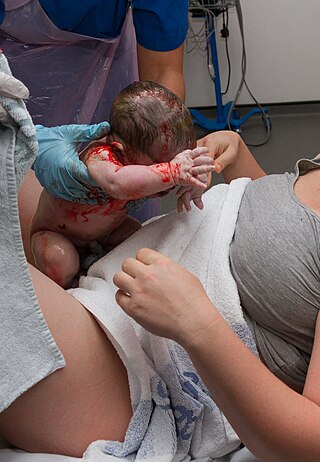Related Research Articles
Obstetrics and gynaecology is the medical specialty that encompasses the two subspecialties of obstetrics and gynecology. The specialization is an important part of care for Women's health.

Gynaecology or gynecology is the area of medicine that involves the treatment of women's diseases, especially those of the reproductive organs. It is often paired with the field of obstetrics, forming the combined area of obstetrics and gynaecology (OB-GYN).
W. David Hager is an American physician with a medical board certification in obstetrics and gynecology. In the fall of 2002, Hager, a leading conservative Christian voice on women's health and sexuality, was appointed to the Advisory Committee for Reproductive Health Drugs in the Food and Drug Administration (FDA) by U.S. President George W. Bush.
Adolescent medicine also known as adolescent and young adult medicine is a medical subspecialty that focuses on care of patients who are in the adolescent period of development. This period begins at puberty and lasts until growth has stopped, at which time adulthood begins. Typically, patients in this age range will be in the last years of middle school up until college graduation. In developed nations, the psychosocial period of adolescence is extended both by an earlier start, as the onset of puberty begins earlier, and a later end, as patients require more years of education or training before they reach economic independence from their parents.

Maternal–fetal medicine (MFM), also known as perinatology, is a branch of medicine that focuses on managing health concerns of the mother and fetus prior to, during, and shortly after pregnancy.
A fellowship is the period of medical training, in the United States and Canada, that a physician, dentist, or veterinarian may undertake after completing a specialty training program (residency). During this time, the physician is known as a fellow. Fellows are capable of acting as an attending physician or a consultant physician in the specialist field in which they were trained, such as internal medicine or pediatrics. After completing a fellowship in the relevant sub-specialty, the physician is permitted to practice without direct supervision by other physicians in that sub-specialty, such as cardiology or oncology.

A pelvic examination is the physical examination of the external and internal female pelvic organs. It is frequently used in gynecology for the evaluation of symptoms affecting the female reproductive and urinary tract, such as pain, bleeding, discharge, urinary incontinence, or trauma. It can also be used to assess a woman's anatomy in preparation for procedures. The exam can be done awake in the clinic and emergency department, or under anesthesia in the operating room. The most commonly performed components of the exam are 1) the external exam, to evaluate the external genitalia 2) the internal exam with palpation to examine the uterus, ovaries, and fallopian tubes, and 3) the internal exam using the speculum to visualize the vaginal walls and cervix. During the pelvic exam, sample of cells and fluids may be collected to screen for sexually transmitted infections or cancer.
Reproductive endocrinology and infertility (REI) is a surgical subspecialty of obstetrics and gynecology that trains physicians in reproductive medicine addressing hormonal functioning as it pertains to reproduction as well as the issue of infertility. While most REI specialists primarily focus on the treatment of infertility, reproductive endocrinologists are trained to also test and treat hormonal dysfunctions in females and males outside infertility. Reproductive endocrinologists have specialty training (residency) in obstetrics and gynecology (ob-gyn) before they undergo sub-specialty training (fellowship) in REI.
Carlos Sueldo is a physician and professor of obstetrics and gynaecology (OB/GYN) for the University of California, San Francisco. Dr. Sueldo is also the founder (1984) and present Director of the in vitro fertilization IVF Fertility Center. Dr. Sueldo concurrently serves as the Scientific Director at the Center for Gynecology and Reproduction (CEGYR) in Buenos Aires, Argentina, and is a founding board member of the World Endometriosis Research Foundation.
Urogynecology or urogynaecology is a surgical sub-specialty of urology and gynecology.

The American College of Obstetricians and Gynecologists (ACOG) is a professional association of physicians specializing in obstetrics and gynecology in the United States. Several Latin American countries are also represented within Districts of the organization. It is a 501(c)(3) organization with a membership of more than 60,000 obstetrician-gynecologists and women's health care professionals. It was founded in 1951.
Obstetrical nursing, also called perinatal nursing, is a nursing specialty that works with patients who are attempting to become pregnant, are currently pregnant, or have recently delivered. Obstetrical nurses help provide prenatal care and testing, care of patients experiencing pregnancy complications, care during labor and delivery, and care of patients following delivery. Obstetrical nurses work closely with obstetricians, midwives, and nurse practitioners. They also provide supervision of patient care technicians and surgical technologists.
In 2006, hospice and palliative medicine was officially recognized by the American Board of Medical Specialties, and is co-sponsored by the American Boards of
Michael L. Brodman is an American gynecologist and obstetrician and currently the Ellen and Howard C. Katz Professor and Chairman of the Department of Obstetrics, Gynecology and Reproductive Science at Mount Sinai Hospital, Mount Sinai Health System, and Icahn School of Medicine at Mount Sinai in New York City. He is recognized internationally as a pioneer in the field of urogynecology.
Inna Berin is a Russian-American obstetrician and gynecologist, specializing in reproductive endocrinology and infertility at the Fertility Institute of New Jersey and New York. Dr. Berin has authored several scientific publications in the field of reproductive endocrinology and infertility.

The American Osteopathic Board of Obstetrics and Gynecology (AOBOG) is an organization that provides board certification to qualified Doctors of Osteopathic Medicine (D.O.) who specialize in the care of the female reproductive tract and children during the course of pregnancy, childbirth, and the postnatal period (obstetricians) and to qualified Doctors of Osteopathic Medicine who specialize in the diagnosis and treatment of diseases of the female reproductive tract (gynecologists). The board is one 18 medical specialty certifying boards of the American Osteopathic Association Bureau of Osteopathic Specialists approved by the American Osteopathic Association (AOA), and was established in 1942. As of December 2011, 1,082 osteopathic obstetricians and gynecologists held active certification with the AOBOG.
An obstetric hospitalist is an obstetrician and gynaecologist physician who is either employed by a hospital or a physician practice and whose duties include providing care for laboring patients and managing obstetric emergencies. Some obstetrics hospitalists also have responsibilities including resident and medical student teaching; providing backup support for family practitioners and nurse midwives, assisting private physicians with surgery, assuming care for ob-gyn patients unassigned to a physician and providing vacation coverage for the private practicing physician.
Alan H. DeCherney is an Obstetrician and Gynecologist who specializes in reproductive endocrinology & infertility. He is experienced in reproductive and endocrinology, infertility, and reproductive genetics.
Jennifer Gunter is a Canadian-American gynecologist, a New York Times columnist covering women's health, an author, and a specialist in chronic pain medicine and vulvovaginal disorders.

The Society of Family Planning (SFP) is an international non-profit professional organization established in 2005 specializing in "abortion and contraception science" composed of physicians, nurses, sociologists, public health practitioners and trainees in these fields. The majority of member physicians include specialists of obstetrics and gynecology, family medicine, and adolescent medicine.
References
- ↑ "American Board of Obstetrics and Gynecology Inc - GuideStar Profile". www.guidestar.org. Retrieved 15 July 2022.
- ↑ "Executive Staff". ABOG.
- ↑ "Officers and Executives". ABOG.
- ↑ "Who is ABOG". ABOG. Retrieved 2022-07-15.
- ↑ "Contact Us". ABOG. Retrieved 2022-07-15.
- ↑ "Member Boards". American Board of Medical Specialties. Retrieved 2022-07-15.
- ↑ "About ABOG". ABOG. Retrieved 2022-08-03.
- ↑ "American Board of Obstetrics and Gynecology Will Begin Construction on New Building". ABOG. Retrieved 2022-08-03.
- ↑ Hess, Amanda (2013-11-25). "Should Gynecologists Be Allowed to Treat Men? A New Board Decision Says No". Slate Magazine. Retrieved 2018-12-01.
- ↑ Grady, Denise (2013-11-27). "Gynecologists May Treat Men, Board Says in Switch". The New York Times. Retrieved 2018-12-01.
- ↑ Grady, Denise (2014-01-31). "Responding to Critics, Gynecology Board Reverses Ban on Treating Male Patients". The New York Times. Retrieved 2018-12-01.
- ↑ "American Board of Obstetrics and Gynecology Names New President". PR Newswire. October 22, 2014. Retrieved July 19, 2021.
- ↑ "ABOG's New Board Officers, Chairs of Subspecialty Divisions, and Subspecialty Division Members Officially Begin Terms". PRNewswire (Press release). Retrieved 20 January 2022.
- ↑ "American Board of Obstetrics and Gynecology". Certification Matters. Retrieved 2022-08-03.
- ↑ "Board Certified Obstetrician Gynecologist". Credly. Retrieved 2022-08-03.
- ↑ "Board Certified Subspecialist in Female Pelvic Medicine & Reconstructive Surgery". Credly. Retrieved 2022-08-03.
- ↑ "Board Certified Subspecialist in Gynecologic Oncology". Credly. Retrieved 2022-08-03.
- ↑ "Board Certified Subspecialist in Maternal-Fetal Medicine". Credly. Retrieved 2022-08-03.
- ↑ "Board Certified Subspecialist in Reproductive Endocrinology & Infertility". Credly. Retrieved 2022-08-03.
- ↑ "Overview for Specialty Certification". ABOG. Retrieved 2022-08-03.
- ↑ "Overview of Subspecialty Certification". ABOG. Retrieved 2022-08-03.
- ↑ "Time Limitations and MOC Ineligibility". ABOG. Retrieved 2022-08-03.
- ↑ "Specialty MOC Requirements". ABOG. Retrieved 2022-08-03.
- ↑ "Professionalism & Professional Standing". ABOG. Retrieved 2022-08-03.
- ↑ "Lifelong Learning and Self-Assessment Overview". ABOG. Retrieved 2022-08-03.
- ↑ "Practice Improvement". ABOG. Retrieved 2022-08-03.
- ↑ "Assessment of Knowledge, Judgement, and Skills Overview". ABOG. Retrieved 2022-08-03.